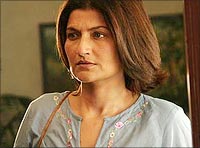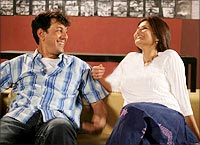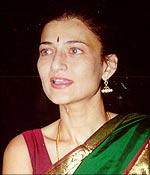Dressed in white, with minimal make-up, eyes sparkling and greener than ever, Sarika strikes you as someone who belongs a little to the past and a little to the present. Friendly, yet distant, willing to humour and yet unflinchingly straightforward, the actress cuts a fine picture.
Sonia Chopra chats with Sarika, as she gets ready for her new release, Bheja Fry, directed by first-timer Sagar Ballary.
You began as a child artist, went on to become a leading lady, took a long time off, and are back again. How do you feel the industry has transitioned through the years?
The industry has changed a lot, especially when it comes to the technical aspects. The kind of technical excellence and expertise that has come in is amazing.
Another place where I see a big change is that we are now making real cinema. It is no longer the norm that you buy a ticket, go into a land of fantasy, and come back. Even that is welcome. I think Lord Of The Rings is a wonderful film and I can do anything to watch it -- or 300 for that matter. But that is not what cinema is all about.
Today, we are making films that are real, and it's happening at every level in the industry, irrespective of the budget. Reality is seeping in slowly and gradually. As an actress, it is wonderful to perform when you're not making a fool of yourself; not doing things that people don't do in their normal lives. I mean, where do people meet and start singing songs in 42 degrees of temperature?
But you have done that in your earlier films...
Yes, we did all that once upon a time. So that's why I can see the difference. Thankfully, Indian cinema has come to a point where we don't do all that anymore.
 Did you miss acting when you had taken a sabbatical?
Did you miss acting when you had taken a sabbatical?
No, not all. That's the best part. It was never an issue. I mean, I was in cinema, working on the sets, behind the camera as a technician. Shots were being taken in front of me, and I never missed being in front of the camera. My acting again just happened by chance; I didn't plan it.
Do you feel welcomed by the industry on your comeback?
I don't even think about that. I just want to see -- if I get four films, or even one film that makes me feel good? If the answer is yes, I am happy. Parzania, for example, is a film I will always look back at with pride. And it's not that I am doing only serious films, Bheja Fry is an out-and-out comedy.
What is your role in Bheja Fry?
I play a singer named Sheetal. She is married to Ranjeet Thadani, a flamboyant executive of a music company played by Rajat Kapoor. They have a few problems, and the film is about how Vinay Pathak's character Bharat Bhushan tries to bring them together. My part is not that comic unfortunately. I wish it was. It's basically Vinay and Rajat's film. And they are just fabulous.
What made you want to be a part of the film?
I was impressed that in such a low budget, in just a few days, six people were determined to make this film. It was their passion that got me. Nobody makes a film in such a small budget these days. We've managed to do that and without any compromise; I think that's credible.
What's the film about?
Apart from the story that revolves around its main characters, I think Bheja Fry is also saying that it's not right to make fun of someone. You are deciding that the other person is an idiot; who told you that you are very intelligent and have the right to do so? Who gives you the right to decide?
 Bheja Fry is an interesting title...
Bheja Fry is an interesting title...
I think it's a great title for the film because Vinay's character does exactly that. He makes everyone's life miserable and drives them nuts. Even otherwise, it's a fun title, depending on whether you're a vegetarian or non-vegetarian. I am the latter, so I love it (Laughs).
It's quite a contrast since you've just finished Parzania which was an intense and serious film.
Yes, and that's the fun of being an actor. I am lucky to be doing diverse films.
Ever since your comeback, you've shown an inclination towards small, independent cinema. Is that a conscious decision?
Yes. Not towards independent cinema, but to try and do interesting films. And if that happens to be a Rs 10 crore film, you will see me there. But yes, I think independent cinema gives directors more scope to experiment. The money riding on the film is less, so there is a certain amount of fearlessness.
You've rejected clichéd roles in mainstream films?
I've rejected bad films, period.
Taking about Parzania and the critical acclaim it received, are you hoping it picks up awards?
Let me speak for myself. My work starts and ends with the film's shooting. After that, how the film does, whether it wins awards I don't think I should get involved with that. The thing to be proud is that we made a good film -- which is not an easy thing. Everyone wants to make a good film, but there are so many people involved in making it that it becomes difficult. I will be proud of this film even at the end of my career. What can be a bigger award than that?
 Which are the other projects you're busy with?
Which are the other projects you're busy with?
There's Harry Puttar where I play a Punjabi woman whose son is Harry. It's a children's film, directed by Rajesh Bajaj. Then there's Manorma Six Feet Under directed by Navdeep Singh and N Chandra's Breaking News.
Despite your extensive experience, you've had no qualms working with first-time directors, as can be seen even in your future projects.
To be honest, I don't think my experience means anything. I don't think people should be talking about and believing in their own experience because it means nothing! Who knows, the next person around the block may be better than you. So I leave my experience at home. I might use it as an actress but never to judge people. I mean look at Rahul Dholakia -- he's one of the very important directors to have come into the industry. He's going to be doing some very different films.
It's great that you encourage new filmmakers. But there's always that element of a risk, isn't there?
I think everyone deserves a chance. But, yes, sometimes this attitude misfires and you end up working with people who don't know the D of direction. But you have to take that chance (shrugs).
You've been lucky there...
Not always (Laughs).
Do you like following world cinema and keeping yourself updated?
Yes, we're all interested in world cinema. I think following world cinema at one time used to be a very happening thing, because you didn't have that kind of access to it. But today, it's no big deal. If you're fond of cinema, you're fond of world cinema.





